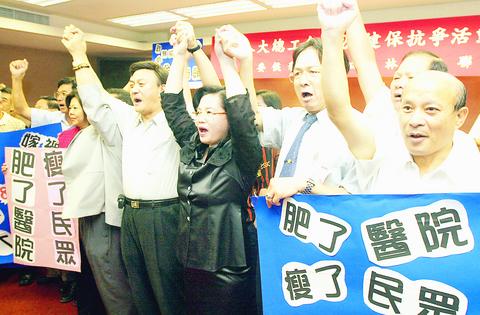Leaders of labor unions yesterday announced that laborers and members of professional groups would take to the streets on Aug. 27 to protest against the government's plan to hike the payments of National Health Insurance (NHI) that go into effect next month.
However, representatives from Taiwan Confederation of Trade Unions (TCTU, 全國產業總工會) said that they have not decided whether to join the demonstration on Aug. 27, saying the TCTU has decided to launch its own protest in front of the Executive Yuan on Aug. 14.
In July, the Department of Health announced a plan to raise the NHI premiums from Sept. 1 to sustain the nation's health-insurance program for two more years.

PHOTO: GEORGE TSORNG, TAIPEI TIMES
Under the scheme, the NHI premiums would be raised from the current 4.25 percent to 4.75 percent of a person's monthly salary and outpatients can expect charges of up to NT$710 per visit at the point of medical treatment.
In a press conference yesterday, PFP lawmaker and the president of the Chinese Federation of Labor (CFL,
"By doing so, we hope that the government can give the plan a second thought before enforcing the fee hike while the economy is slumping and the unemployment rate remains high."
Lin also accused the Cabinet of "deliberately announcing the fee-hike plan when the Legislative Yuan is not in session to evade lawmakers' interference."
Established in 1948, the CFL, Taiwan's largest and oldest federation of trade unions, has more than 3 million members nationwide while the TCTU, established only two years ago, consists of 280,000 members.
The press conference, organized by Lin and KMT lawmaker Hou Tsai-feng (
CFL aims to gather more than 50,000 laborers from around the nation to join the demonstration, during which the protesters will march to the DPP's headquarters, Executive Yuan and the Presidential Office.
During the press conference, however, TCTU General-Secretary Kuo Kuo-wen (郭國文) said, "Since we were not informed of the proposed [Aug. 27] demonstration when CFL and other labor unions prepared for it, we have decided to organize our own protest on Aug. 14."
Huang Jen-wei (黃真瑋), secretary of the CFL, told the Taipei Times that the CFL and the National Labor Union had held their own separate internal meetings to discuss launching individual protests.
"But later we thought it might be better if all major trade unions could jointly demonstrate. That is when we sent out invitations to the other six major labor unions regarding today's press conference," she said.
Kuo also said that the TCTU had not yet decided whether to participate in the demonstration on Aug. 27 because "we have to further discuss whether our stance and opinion toward the hike in NHI fees matches those of the other labor unions."
"TCTU is not totally against the raise in NHI fee and we understand that there is an urgent need to solve the financial problems faced by our NHI program," Kuo said.
"But the government should not threaten the insured with the bankruptcy of the health insurance program to get money from the public."

AIR SUPPORT: The Ministry of National Defense thanked the US for the delivery, adding that it was an indicator of the White House’s commitment to the Taiwan Relations Act Deputy Minister of National Defense Po Horng-huei (柏鴻輝) and Representative to the US Alexander Yui on Friday attended a delivery ceremony for the first of Taiwan’s long-awaited 66 F-16C/D Block 70 jets at a Lockheed Martin Corp factory in Greenville, South Carolina. “We are so proud to be the global home of the F-16 and to support Taiwan’s air defense capabilities,” US Representative William Timmons wrote on X, alongside a photograph of Taiwanese and US officials at the event. The F-16C/D Block 70 jets Taiwan ordered have the same capabilities as aircraft that had been upgraded to F-16Vs. The batch of Lockheed Martin

GRIDLOCK: The National Fire Agency’s Special Search and Rescue team is on standby to travel to the countries to help out with the rescue effort A powerful earthquake rocked Myanmar and neighboring Thailand yesterday, killing at least three people in Bangkok and burying dozens when a high-rise building under construction collapsed. Footage shared on social media from Myanmar’s second-largest city showed widespread destruction, raising fears that many were trapped under the rubble or killed. The magnitude 7.7 earthquake, with an epicenter near Mandalay in Myanmar, struck at midday and was followed by a strong magnitude 6.4 aftershock. The extent of death, injury and destruction — especially in Myanmar, which is embroiled in a civil war and where information is tightly controlled at the best of times —

Taiwan was ranked the fourth-safest country in the world with a score of 82.9, trailing only Andorra, the United Arab Emirates and Qatar in Numbeo’s Safety Index by Country report. Taiwan’s score improved by 0.1 points compared with last year’s mid-year report, which had Taiwan fourth with a score of 82.8. However, both scores were lower than in last year’s first review, when Taiwan scored 83.3, and are a long way from when Taiwan was named the second-safest country in the world in 2021, scoring 84.8. Taiwan ranked higher than Singapore in ninth with a score of 77.4 and Japan in 10th with

China's military today said it began joint army, navy and rocket force exercises around Taiwan to "serve as a stern warning and powerful deterrent against Taiwanese independence," calling President William Lai (賴清德) a "parasite." The exercises come after Lai called Beijing a "foreign hostile force" last month. More than 10 Chinese military ships approached close to Taiwan's 24 nautical mile (44.4km) contiguous zone this morning and Taiwan sent its own warships to respond, two senior Taiwanese officials said. Taiwan has not yet detected any live fire by the Chinese military so far, one of the officials said. The drills took place after US Secretary